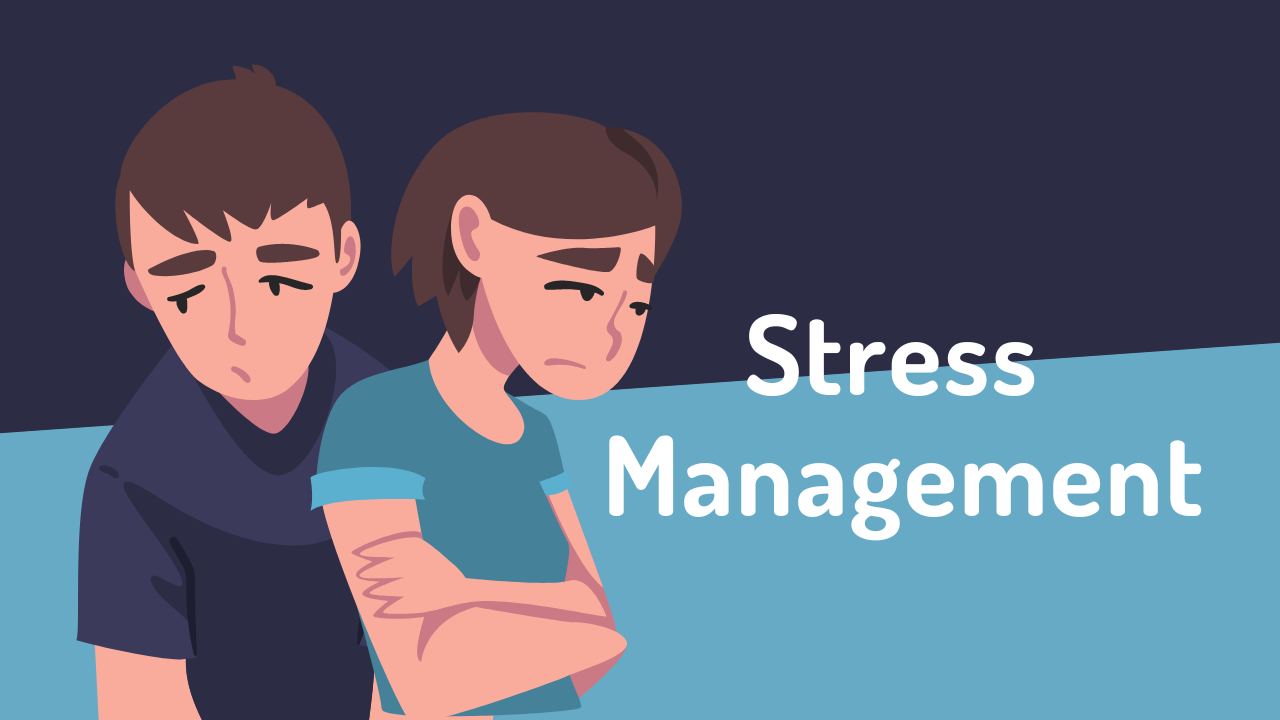Stress Management
Stress Management
STRESS MANAGEMENT
WHAT DO YOU MEAN BY STRESS?
Stress can be defined as a state of worry or mental tension caused by a difficult situation. Stress is a natural human response that prompts us to address challenges and threats in our lives.
WHAT IS STRESS MANAGEMENT?
Stress management offers a range of strategies to help you better deal with stress and difficulty (adversity) in your life. Managing stress can help you lead a more balanced, healthier life. Stress is an automatic physical, mental, and emotional response to a challenging event. It’s a normal part of everyone’s life.
In small doses, stress can have some unexpected benefits.
Believe it or not, some stress is beneficial to your health. In fact, your body is hardwired to deal with normal everyday stressors. There are two types of stress, one of which scientists refer to as eustress, or ‘good’ stress. Some positive life events, such as starting a new job, going to college, or having a baby, can cause short-term stress. This type of stress activates your natural flight or fight defenses, allowing you to not only cope with but also benefit from the situation. Chronic stress, or distress, is, of course, bad stress that is harmful to your health and mental well-being and should be avoided as much as possible. Small amounts of beneficial stress, on the other hand, have some unexpected health benefits.
Stress Improves Brain Function: A study at the University of California, Berkeley discovered that certain levels of stress increase alertness and improve cognitive performance. Stress caused stem cells in the test subjects to form new nerve cells, which improves brain function. So, a little stress at work can boost productivity and creativity. Remember that when you have a deadline approaching.
It aids in the prevention of illness: The flight or fight mechanism of the body is intended to protect you from injury or any other perceived threat. According to a Stanford study, moderate stress increases the production of interleukins, which boost your immune system and help you fight off illnesses. So, if you’re worried about going to the doctor or getting an injection, your anxiety may actually help you recover faster or make immunization more effective.
You Develop More Resilience: The adage “what doesn’t kill you makes you stronger” holds some truth. The more moderate stress you successfully manage, the easier it will be to deal with stress, good or bad, later. Because you’ve trained yourself on how to deal with stressors, you’ll remember them.
Stress Enhances MemoryThis is directly related to your improved cognitive function. Your memory improves as your brain cell connections multiply. According to the UC Berkley researchers, animals who remember stressful situations such as almost being eaten help them remember how to avoid being in the same situation again.
Stress Improves Concentration and Learning: Short-term stress causes a surge of energy that is intended to help you stay focused. According to Kathleen Gunthert, a psychology professor at American University, “medium levels of stress can enhance our motivation.” This can motivate you to study more, and focusing allows you to learn more. That is why exam cramming works.
Stress During Pregnancy Can Improve Your Children’s Intelligence: A Johns Hopkins University study found that children of mothers who were mildly or moderately stressed during pregnancy were smarter and more advanced than the control group at age two. So, a little stress during pregnancy will not harm your baby and may even help you produce a Little Einstein.
Moderate Stress Is Beneficial to Your Mental Health: Small amounts of stress can actually improve your mental health. According to Melanie Greenberg, Ph.D., of Psychology Today, experiencing manageable stressors with recovery in between can make you mentally tougher. She wrote that minor stress makes us stronger, more tolerant, and better able to tolerate and adapt to life’s challenges. In a nutshell, that is good mental health.
Stress-Relieving Strategies
- Exercise
Working out on a regular basis is one of the most effective ways to relax your body and mind. Exercise will also improve your mood. However, you must do it frequently for it to be effective. So, how much exercise should you do each week? Work up to 2 hours and 30 minutes of moderately intense exercise, such as brisk walks, or 75 minutes of vigorous exercises, such as swimming laps, jogging, or participating in sports. Set fitness goals that you can achieve so that you don’t give up. Most importantly, remember that any exercise is preferable to none at all.

- Muscles Should Be Relaxed
Your muscles tense up when you’re stressed. You can help loosen them up and refresh your body on your own by:
- Stretching
- Having a massage
- Bathing or showering in a hot bath or shower
- Having a restful night’s sleep
- Deep Inhalation
Stopping and taking a few deep breaths can immediately relieve stress. You’ll be surprised at how much better you’ll feel once you’ve mastered it. Simply follow these 5 steps:
- Place your hands in your lap and your feet on the floor in a comfortable position. You can also lie down.
- Close your eyes for a moment.
- Consider yourself in a relaxing environment. It could be on the beach, in a beautiful field of grass, or anywhere else that makes you feel peaceful.
- Take slow, deep breaths in and out.
- Perform this exercise for 5 to 10 minutes at a time.
- Eat Healthily
Eating a well-balanced diet on a regular basis will help you feel better in general. It may also aid in mood regulation. For energy, your meals should be high in vegetables, fruit, whole grains, and lean protein. And don’t forget any. It’s bad for you and can put you in a bad mood, which can make your stress worse.
- Take it Slowly
Modern life is so hectic that sometimes we just need to slow down and relax. Look around your life for small ways to do this. As an example: Set your watch to 5 to 10 minutes ahead of time. You’ll arrive a little earlier and avoid the stress of being late. Switch to the slow lane when driving on the highway to avoid road rage. Divide large tasks into smaller ones. For example, if you don’t have to, don’t try to answer all 100 emails; instead, respond to a few of them.
- Take a Rest
You should schedule some genuine downtime to give your mind a break from stress. If you like to set goals, this may be difficult for you at first. But if you stick with it, you’ll start looking forward to these moments. You can relax by doing the following:
- Meditation
- Yoga
- Tai Chi
- Prayer
- Playing your favourite music
- Spending time outside in nature


Allow Time for Hobbies
You must make time for activities that you enjoy. Try to do something that makes you feel good every day to help relieve stress. It doesn’t have to take long; even 15 to 20 minutes will suffice. Relaxing hobbies include the following:
Reading Knitting
Creating an art project
Taking up golf
I’m watching a movie.
Making puzzles
Card games and board games
Discuss Your Concerns
If something is bothering you, talking about it can help you relax. You can discuss your feelings with family members, friends, a trusted clergyman, your doctor, or a therapist. You can also converse with yourself. Self-talk is something we all do. However, in order for self-talk to help reduce stress, it must be positive rather than negative. So, when you’re stressed, pay close attention to what you’re thinking or saying. Change the negative message you’re sending yourself to a positive one. Don’t tell yourself, for example, “I can’t do this.” Instead, tell yourself, “I can do this,” or “I’m doing the best I can.”
Take it easy on yourself.
Accept that no matter how hard you try, you will never be able to do everything perfectly. You also don’t have complete control over your life. So, do yourself a favour and stop believing you can accomplish so much. And remember to keep your sense of humour. Laughter can help you feel more at ease.
Remove Your Triggers
Determine the major sources of stress in your life. Is it your job, your commute, or your studies? If you can identify what they are, see if you can eliminate or at least reduce them from your life.

Symptoms of stress
Aches and pains are physical symptoms of stress.
- Chest pain or the sensation that your heart is racing.
- Exhaustion or difficulty sleeping.
- Headaches, dizziness, or shaking are all possible symptoms.
- Blood pressure that is too high.
- Muscle tension or clenching of the jaw.
- Problems with the stomach or digestive system.
- Having sex is difficult.
- Immune system weakness.
Stress can cause emotional and mental symptoms such as:
- Irritability or anxiety.
- Depression.
- Panic attacks occur.
- Sadness.
People suffering from chronic stress frequently attempt to cope by engaging in unhealthy behaviors such as
- excessive or frequent alcohol consumption.
- Gambling.
- Overeating or the emergence of an eating disorder.
- Compulsively engaging in sex, shopping, or internet browsing.
- Smoking.
- Taking drugs.
Stress has a wide range of effects.
Stress symptoms can have an impact on your body, your thoughts and feelings, and your behavior. Recognizing common stress symptoms can help you manage them. Unmanaged stress can contribute to a variety of health issues, including high blood pressure, heart disease, obesity, diabetes, and cholesterol.
PYRAMID THERAPY
MEANING: Pyramid Therapy is one of the world’s oldest therapies. Pyramid therapy has the ability to heal all ailments and diseases. Most people associate pyramids with Egypt. However, the benefits of the pyramid shape were described by Indian Rishis much earlier in India, and temples in India had this pyramid shape at the top thousands of years ago. This is the shape of the ‘Yagna Kund‘s‘ base. Pyro refers to the Agni tatva, and amid refers to the earth’s surface.
Process of using pyramid: The pyramid’s apex releases energy that is full-pyramid-picture-jetty in nature, and the energy released from the base has a cooling effect. When using the pyramid, keep these factors in mind. Pyramids should be placed on the affected organ for 10-20 minutes daily for general treatments. Every home should have a small pyramid to prevent and cure all diseases. The pyramid should be aligned before use for best results.
What it is used for: A person meditating in a pyramid exhibits EEG patterns similar to those observed in people practicing transcendental meditation. The benefits of meditating inside a Pyramid are astounding. People experience a state of relaxation, clairvoyance, clairaudience, and tranquillity. They will sleep deeply and wake up refreshed if they sleep in a pyramid; only a few hours of sleep will provide complete relaxation. Reading inside the pyramid allows for greater concentration and comprehension. Plant growth is aided by electromagnetic phenom, according to agricultural experts. Within the Pyramid, there is a Healing-Pyramid-Complete-Rubbish-Hippy-3enon. Water in the pyramid has curative properties, particularly for chronic skin disorders. Pyramids can slow down the aging process, as demonstrated by lower forms of life. Women who sleep in pyramids have regular and normal periods and have no dysmenorrhea. Pyramids collect a variety of energies, including negative ions, and electromagnetic and cosmic vibrations. Because of their pyramidal shape, even grains of sand from specific locations have therapeutic properties.
Caution: A pyramid is a drug-free therapy. It has no negative side effects. When using the pyramid, one should lie on a wooden bed with no contact with the floor; otherwise, the treatment’s efficacy will be compromised.
The Advantages of Pyramid Meditation
Meditation under pyramids helps to align and heal the seven chakras. When this occurs, people in the pyramid have a variety of experiences. Some people experience pure bliss. Others become extremely relaxed. The advantages of Pyramid Meditation are numerous. Here are a few examples:
- Enhances Vision
Pyramid meditation can assist you in improving and correcting your vision. There are courses available that help with both strengthening and shaping the eye muscles.
- Enhances Hearing
There are a couple of hearing issues that can be improved and sharpened by using pyramid meditation energy.
- High Blood Pressure May Be Reduced
Hypertension is another term for high blood pressure. This can be significantly reduced if pyramid meditation is practiced on a daily basis. By practicing this type of meditation, you can relieve stress and enjoy life to the fullest.
- Insomnia may be reduced.
Millions of people suffer from insomnia all over the world. Pyramid meditation can help to calm the mind and relax the legs. People who slept in the pyramids reported a significant improvement in their sleeping habits.
- Provides Arthritis Relief
Pyramid meditation is an excellent treatment for anyone suffering from arthritis. Even back pain can be alleviated if you practice this meditation on a daily basis.
- Heals Open Wounds and Broken Bones
The healing of sore and broken bones is one of the most unique and amazing benefits of pyramid meditation. Those who lead an active lifestyle should consider pyramid meditation.
- Acne and zits are reduced.
Pyramid meditation can help you get rid of all kinds of acne and skin problems.
- Assists Students with Concentration
Students and teachers alike enjoy pyramid meditation. It helps to sharpen their memory and boost their confidence. Exams can be easily prepared for without feeling stressed or anxious.
- Provides Energy
Drinking water that has been charged with pyramid energy is a more efficient energy source.
- It provides headache relief.
If you suffer from migraines or headaches, you should definitely try pyramid meditation. This will aid in your recovery.
- It provides relief from irregular periods.
Women who slept in the pyramids reported that their menstrual cycles improved.
- Enhances Cognitive Abilities
Pyramid meditation improves mental functions. It improves intelligence and concentration. It also maintains emotional balance.
- Hormone Levels are Balanced
Pyramid meditation improves thyroid gland functions, which produce hormones. As a result, it helps to maintain the body’s hormonal balance.








